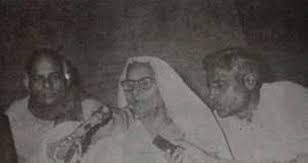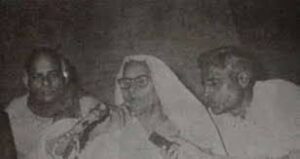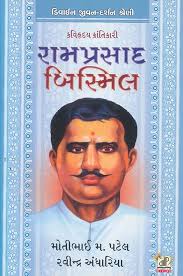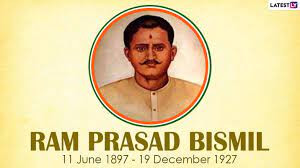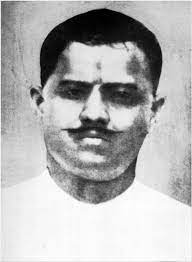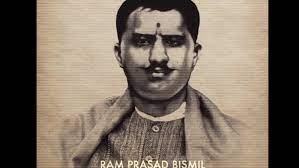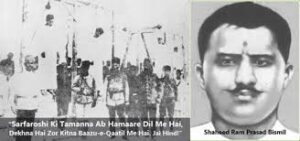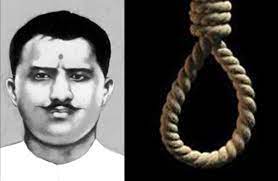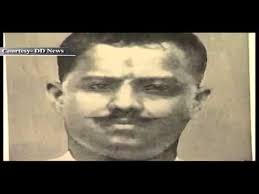Ram Prasad Bismil was a prominent Indian revolutionary who played a crucial role in the Indian independence movement. The principles of liberation fighters like Ramakrishna Paramahamsa and Swami Vivekananda had a profound impact on Bismil, who was born in Uttar Pradesh in 1897. He actively participated in a number of revolutionary movements opposing British colonial power.
The Hindustan Republican Association (HRA), subsequently renamed the Hindustan Socialist Republican Association (HSRA), had Bismil as one of its founding members. He participated in several acts of resistance against the British government, including the Kakori Conspiracy of 1925. Where the HRA attempted to rob a train carrying government funds. This incident led to Bismil’s arrest and subsequent trial.
Despite facing severe repression from the British authorities, Bismil remained steadfast in his commitment to the cause of Indian independence. He composed several patriotic poems and songs that inspired many revolutionaries and ordinary citizens alike. Bismil’s courage, sacrifice, and unwavering dedication to the freedom struggle continue to inspire generations of Indians.
Bismil was executed by the British government on December 19, 1927, at the age of thirty. However, his legacy lives on as a symbol of courage, patriotism, and selfless sacrifice in the fight against colonial oppression. He remains a revered figure in Indian history, revered for his indomitable spirit and commitment to the cause of freedom.
Ram Prasad Bismil Early Life:
Ram Prasad Bismil was born on June 11, 1897, in Shahjahanpur, Uttar Pradesh, British India. His original name was Ram Prasad Bismil, but he went under the moniker “Bismil.” He was exposed to the liberation struggle at a young age and came from a very patriotic family. Bismil received his early education in a madrasa, where he learned Urdu, Persian, and Arabic. Despite facing financial difficulties, he was a diligent student and developed a passion for literature and poetry.
Bismil’s literary interests led him to become involved in revolutionary activities aimed at achieving India’s independence. The writings of well-known rebels like Shahid-e-Azam Bhagat Singh especially influenced him. In 1919, Bismil founded the organization “Matrivedi,” dedicated to promoting Hindi literature. However, his focus gradually shifted towards the fight for India’s freedom.
Bismil actively participated in Mahatma Gandhi’s Non-Cooperation Movement of 1920, using his literary skills to mobilise people. He strongly believed in the power of the youth to bring about change and was instrumental in forming the Hindustan Republican Association (HRA) in 1924. Which later became the Hindustan Socialist Republican Association (HSRA).
A strong sense of patriotism, a dedication to social justice, and a love of literature characterised Ram Prasad Bismil’s early years and ultimately drove him to join the revolutionary movement for India’s independence. His life and contributions continue to inspire generations of Indians who value the principles of freedom and justice.
Ram Prasad Bismil Education:
The Indian independence movement’s leading figure, Ram Prasad Bismil, was born in Shahjahanpur, Uttar Pradesh, on June 11, 1897. Bismil was a highly ambitious and self-driven guy who understood the importance of education in bringing about societal change, despite experiencing financial difficulties in his early life.
Bismil’s educational journey began in a local madrasa, where he learned Urdu and Persian. However, due to financial constraints, he had to discontinue his formal education. Nevertheless, his thirst for knowledge led him to become an avid reader and a self-taught scholar. He delved into literature, philosophy, and revolutionary ideas that fueled his passion for the freedom struggle.
Realizing the importance of education as a tool for empowerment, Bismil became involved in educational activities. He established the Arya Samaj branch in Shahjahanpur and worked towards promoting education among the masses. Bismil firmly believed that an educated society was essential for the success of any revolutionary movement.
Despite his minimal formal education, Bismil’s dedication to learning and raising awareness was critical in formulating his revolutionary worldview. He was fluent in several languages and had a thorough awareness of the sociopolitical challenges of his time.
Ram Prasad Bismil’s dedication to the cause of Indian independence and his advocacy for education as a means of enlightenment highlight the importance he placed on knowledge in the pursuit of freedom. His legacy continues to inspire generations of Indians who value education as a powerful tool for societal transformation.
Involvement in the Freedom Struggle:
Ram Prasad Bismil was a prominent freedom fighter in the Indian independence movement. Born on June 11, 1897, in Shahjahanpur, Uttar Pradesh, Bismil played a crucial role in various revolutionary activities against British colonial rule.
Early 20th-century political and socioeconomic circumstances in India had a significant impact on Bismil. He joined the revolutionary organization called the Hindustan Republican Association (HRA), which later became the Hindustan Socialist Republican Association (HSRA). With armed resistance, Bismil aimed to realise his commitment to the cause of an independent and free India.
One of the notable contributions of Bismil was his involvement in the Kakori Conspiracy of 1925. Along with other revolutionaries like Ashfaqulla Khan, Rajendra Lahiri, and Chandrashekhar Azad. Bismil masterminded the daring train robbery at Kakori to fund the revolutionary activities. Though the attempt failed, it brought attention to the cause of independence and the sacrifices made by these revolutionaries.
Bismil was also an accomplished poet and wrote powerful patriotic verses that inspired many. His literary works, including the famous poem “Sarfaroshi Ki Tamanna,” continue to resonate with the spirit of the freedom struggle. Despite facing imprisonment and torture by the British authorities, Bismil remained steadfast in his commitment to the cause.
Ram Prasad Bismil was eventually captured and sentenced to death for his involvement in the Kakori conspiracy. In Gorakhpur Jail, he was hung on December 19, 1927. His sacrifice and dedication to the freedom struggle have made him a symbol of courage and patriotism in the history of India’s fight for independence. Ram Prasad Bismil’s legacy lives on, inspiring generations to come to cherish and uphold the values of freedom and justice.
Role in Kakori Conspiracy:
Ram Prasad Bismil played a significant role in the Kakori Conspiracy, a historic event in the Indian independence movement against British colonial rule. Born on June 11, 1897, in Shahjahanpur, Uttar Pradesh, Bismil was a prominent revolutionary. A key member of the Hindustan Republican Association (HRA), later renamed the Hindustan Socialist Republican Association (HSRA).
On August 9, 1925, a gang of HSRA rebels attempted to rob a train in Kakori, near Lucknow. The aim was to loot the government treasury carried in the train to fund their revolutionary activities. The plan, however, went awry, leading to the arrest of several revolutionaries.
Ram Prasad Bismil, along with Ashfaqulla Khan, Roshan Singh, and others, was implicated in the conspiracy. During the trial, Bismil displayed immense courage and conviction, using the platform to articulate the political motivations behind their actions. He famously wrote the poem “Sarfaroshi ki Tamanna” expressing the revolutionary spirit and determination to sacrifice for the cause of independence.
Ultimately, Bismil was sentenced to death, and he was executed on December 19, 1927. His sacrifice and dedication to the cause of freedom made him a symbol of inspiration for future generations of Indians fighting against colonial oppression. Ram Prasad Bismil’s role in the Kakori Conspiracy remains a crucial chapter in the history of India’s struggle for independence, highlighting the courage and sacrifice of those who dared to challenge the British rule.
Formation of the Hindustan Republican Association (HRA):
Ram Prasad Bismil played a crucial role in the formation of the Hindustan Republican Association (HRA). It then changed its name to the Hindustan Socialist Republican Association (HSRA). The goal of the HRA, founded in 1924, was to use revolutionary methods to bring about total independence for India. Bismil, along with other like-minded revolutionaries such as Sachindra Nath Sanyal and Jogesh Chatterjee, was instrumental in bringing together a group of young nationalists. Who were disillusioned with the non-violent methods of the Indian National Congress.
The Human Rights Act was established on socialist principles and attempted to establish a democratic republic in India. It pushed for the removal of British control and the installation of a democratic, egalitarian administration. Bismil believed in armed revolution as a means to achieve these objectives and saw the need for a disciplined and well-organized group of revolutionaries.
The HRA actively participated in various revolutionary activities against the British government, including the Kakori Conspiracy in 1925, in which Bismil played a key role. The association faced challenges, internal conflicts, and repression from the British authorities, but it left a significant impact on the course of India’s struggle for independence.
Over time, the HRA underwent changes and transformations, eventually merging with another revolutionary group to form the Hindustan Socialist Republican Association (HSRA) in 1928. The HSRA continued the struggle for India’s independence and became known for its commitment to socialism and anti-imperialism. Through radical and militant measures, Ram Prasad Bismil dedicated himself to the cause of India’s freedom, as seen by his contributions to the founding of these revolutionary societies.
Ram Prasad Bismil Poetry:
Ram Prasad Bismil, a prominent figure in the Indian independence movement, was not only a revolutionary but also a poet. “Sarfaroshi Ki Tamanna” (The Desire for Sacrifice), composed in 1925 amid the Kakori conspiracy, is among his most well-known poems. This poem reflects the spirit of sacrifice and determination for the cause of freedom. Here is a paragraph summarizing the essence of Bismil’s poetry:
Ram Prasad Bismil’s poetry is a powerful expression of his deep commitment to the struggle for independence. In “Sarfaroshi Ki Tamanna” and other works, he weaves words that resonate with patriotism, courage, and the willingness to sacrifice for the greater good. Bismil’s verses not only capture the fervor of the times but also serve as a timeless testament to the indomitable spirit of those who fought for India’s freedom. His poetic creations continue to inspire generations, reminding us of the sacrifices made by the heroes of the independence movement.
Literary Contributions:
Ram Prasad Bismil was a prominent freedom fighter and poet in the Indian independence movement. His literary contributions played a significant role in inspiring and mobilizing people against British colonial rule. In addition to being a revolutionary, Bismil was also a prolific writer who promoted resistance and patriotism through his writing.
One of his most well-known literary works is the poem “Sarfaroshi Ki Tamanna,” which functioned as a revolutionary anthem. The poem expressed the fervent desire for sacrifice and martyrdom in the cause of freedom. The words “Sarfaroshi ki tamanna ab hamare dil mein hai, dekhna hai zor kitna bazu-e-kaatil mein hai” (Let’s see how much power the oppressor’s arms have, let’s see how much yearning for revolution is now in our hearts). Struck a profound chord with the aspirations of people struggling for freedom.
Aside from his poems, Bismil was well-known for his essays and articles promoting the cause of independence. His writings often highlighted the need for unity among the Indian masses and the importance of sacrificing personal interests for the greater good of the nation.
The literary works of Bismil were more than just words on paper; they were a potent means of rousing the public and inspiring pride and tenacity. Even now, people still appreciate his poems and writings for their powerful language and ability to inspire new generations to pursue liberty and justice.
Kakori Train Robbery:
Ram Prasad Bismil was one of the prominent freedom fighters in the Indian independence movement, known for his involvement in the Kakori Train Robbery. The Kakori Train Robbery took place on August 9, 1925, near Kakori, a town in present-day Uttar Pradesh, India. Ram Prasad Bismil, along with his associates from the Hindustan Republican Association (HRA). Executed the daring robbery with the aim of obtaining funds for revolutionary activities against British colonial rule.
The target of the robbery was a train carrying government funds. Bismil, along with Ashfaqullah Khan, Rajendra Nath Lahiri, Roshan Singh, and others, stopped the train and looted the money meant for the British government. Inspired by their dream of an independent and free India, the revolutionaries felt that such acts of disobedience were essential to undermining the colonial machinery.
However, the Kakori Train Robbery had significant consequences. The British authorities launched a widespread crackdown on revolutionaries, leading to the arrest of several key figures, including Ram Prasad Bismil. In 1927, Bismil received a death sentence for his involvement in the Kakori plot alongside Ashfaqullah Khan and Roshan Singh.
Despite the draconian sentence, the Kakori Train Robbery and its aftermath fueled the burgeoning spirit of resistance to British rule. Being a symbol of the fighters’ unwavering conviction in the struggle for India’s freedom, Ram Prasad Bismil’s deeds and sacrifices continue to make him a household name.
Ram Prasad Bismil Arrest:
During the Indian independence movement, poet and notable freedom fighter Ram Prasad Bismil was active. His involvement in numerous revolutionary operations against Indian British colonial rule was active. In Shahjahanpur, Uttar Pradesh, on June 11, 1897, Bismil was born.
One of the notable events in Ram Prasad Bismil’s life was his involvement in the Kakori Conspiracy of 1925. Bismil, along with other revolutionaries such as Ashfaqulla Khan, Chandrasekhar Azad, and others, planned and executed the Kakori train robbery as a symbolic act to protest against British exploitation in India.
The Kakori Conspiracy involved the looting of a train carrying government funds. The aim was to use the funds for the revolutionary activities against British rule. Nonetheless, the plan failed, and Bismil was arrested by the British government, along with a number of other conspirators.
Bismil was then put on trial, and he defended himself bravely and convincingly. He was given the death penalty in spite of his attempts. Gorakhpur Jail saw the execution of Ram Prasad Bismil on December 19, 1927.
His legacy continues to inspire generations of Indians who admire his commitment to the cause of independence and his dedication to the principles of freedom and justice. Regarded with reverence and respect in Indian history are Ram Prasad Bismil’s contributions to the independence movement.
Participation in Kakori Conspiracy:
Ram Prasad Bismil was a prominent freedom fighter and poet who played a significant role in the Indian independence movement during the early 20th century. Against British control, he actively participated in a number of revolutionary movements. One of the notable incidents in which Bismil participated was the Kakori Conspiracy of 1925.
The Kakori Conspiracy was a train robbery on August 9, 1925, near Kakori, a town in modern-day Uttar Pradesh, India. To fuel their anti-British operations, the revolutionaries planned to loot the government money that was being transferred by train. Rebels like as Ashfaqulla Khan, Roshan Singh, Rajendra Lahiri, and Ram Prasad Bismil planned and carried out the audacious act.
During the robbery, the revolutionaries stopped the train at Kakori, looted the treasury, and managed to escape temporarily. However, the British authorities eventually tracked down the conspirators. The trial resulted in a death sentence for Ram Prasad Bismil and his allies.
Bismil’s participation in the Kakori Conspiracy reflected his commitment to the cause of Indian independence and his willingness to take bold actions against the British colonial rule. Despite facing severe consequences, Bismil and his fellow revolutionaries left a lasting impact on the struggle for freedom in India, inspiring future generations of freedom fighters.
Ram Prasad Bismil Execution:
Ram Prasad Bismil was a prominent freedom fighter in India who played a crucial role in the Indian independence movement. Following a trial, Ram Prasad Bismil and his allies received a death sentence. Ram Prasad Bismil, along with his associates, was implicated in the Kakori Conspiracy Case.
The Kakori Conspiracy Case was a train robbery that took place on August 9, 1925, near Kakori, a town near Lucknow in present-day Uttar Pradesh, India. The charges against Ashfaqulla Khan, Rajendra Nath Lahiri, Roshan Singh, and other rebels included Ram Prasad Bismil stealing from the train that was carrying state funds.
After a trial, Ram Prasad Bismil was sentenced to death. His hanging took place in the Gorakhpur Jail on December 19, 1927. Before his execution, Bismil wrote several poems and a letter to his younger brother, expressing his love for the country and his commitment to the cause of freedom.
Ram Prasad Bismil’s bravery and dedication to the independence cause made him a symbol of valour and patriotism in India. His works inspire future generations, and he is recognised for his contributions to the independence struggle.
Ram Prasad Bismil Trial:
Ram Prasad Bismil was a prominent freedom fighter in India during the early 20th century. He played a crucial role in the Kakori Conspiracy of 1925, which aimed to protest against British colonial rule. The trial of Ram Prasad Bismil and his fellow revolutionaries represents a watershed moment in India’s quest for independence.
The Kakori Conspiracy was an attempt by a group of revolutionaries, including Ram Prasad Bismil, to loot the government treasury carried in a train at Kakori near Lucknow. The objective was to use the funds for the revolutionary activities against the British regime. His works inspire future generations, and he is recognised for his contributions to the independence struggle.
The trial of Ram Prasad Bismil took place in the British colonial court. During the proceedings, Bismil conducted himself with great courage and dignity, representing the spirit of the freedom struggle. He utilised the trial to express his discontent against British rule and urge for independence.
Despite Bismil and his supporters’ defence, the British colonial administration remained dedicated to quelling revolutionary movements. In the end, Ram Prasad Bismil received a death sentence alongside Ashfaqullah Khan and other individuals. Christmas 19, 1927, saw Bismil stoned to death in Gorakhpur Jail. However, his bravery and selflessness inspired many Indians to struggle for their independence in the years that followed.
The trial of Ram Prasad Bismil and his associates became a symbol of resistance against British oppression and fueled the fervor for independence. Bismil’s unwavering commitment to the cause of freedom and his fearless demeanor during the trial have immortalized him as a national hero in the history of India’s struggle for independence.
Ram Prasad Bismil Honors:
Ram Prasad Bismil was a prominent freedom fighter and revolutionary during the Indian independence movement. Born on June 11, 1897, in Shahjahanpur, Uttar Pradesh, he played a significant role in the Kakori Conspiracy of 1925. An attempt to rob the British government treasury for funding revolutionary activities.
Bismil was a prolific writer and poet, and his literary contributions reflected his deep commitment to the cause of independence. One of his most famous works is the patriotic poem “Sarfaroshi Ki Tamanna,” which became a rallying cry for the youth during the freedom struggle.
Despite facing immense challenges and opposition from the British colonial rulers, Bismil remained resolute in his pursuit of a free and independent India. His bravery and dedication to the cause earned him respect among his fellow revolutionaries and the common people alike.
When the British authorities hanged Ram Prasad Bismil on December 19, 1927, his life tragically came to an end. However, his legacy and contributions to the Indian freedom struggle continue to inspire generations of Indians. For his dedication and selflessness in serving his country, Bismil is revered as a national hero. As a symbol of the courage, devotion, and unwavering will of those who battled for their nation’s freedom, he will go down in Indian history as a hero.
Ram Prasad Bismil Legacy:
Ram Prasad Bismil was a prominent freedom fighter in the Indian independence movement against British colonial rule. Born on June 11, 1897, in Shahjahanpur, Uttar Pradesh, Bismil played a crucial role in the Kakori Conspiracy of 1925, which aimed to protest against British exploitation and tyranny.
Bismil was not only a revolutionary but also a poet and writer. His patriotic poems, particularly the famous “Sarfaroshi Ki Tamanna,” inspired many to join the struggle for independence. His writings reflected his deep commitment to the cause of freedom and his disdain for injustice.
One of the significant contributions of Ram Prasad Bismil was his involvement in the Hindustan Republican Association (HRA), later renamed the Hindustan Socialist Republican Association (HSRA). The organization advocated for complete independence and the establishment of a socialist republic in India.
Bismil was instrumental in planning and executing the Kakori Conspiracy, an act of defiance against the British government. The conspirators aimed to loot the government treasury carried in a train at Kakori and use the funds to support their revolutionary activities. But the scheme backfired, which resulted in Bismil’s detention.
Despite facing a trial, Bismil remained steadfast in his commitment to the cause of independence. He, along with his fellow revolutionaries, faced the gallows with courage and conviction. December 19, 1927, saw the hanging of Ram Prasad Bismil, who left behind a record of sacrifice and loyalty to his nation.
The legacy of Ram Prasad Bismil continues to inspire generations of Indians. Even today, people recite his poems, and his life story represents the unwavering determination of those who battled for India’s independence. Bismil’s loyalty to the values of justice, equality, and loyalty continues to inspire people seeking a better and more just society.
Ram Prasad Bismil Fact:
Ram Prasad Bismil was a prominent Indian revolutionary who played a significant role in the Indian independence movement against British colonial rule. Freedom and nationalism had an early impact on Bismil, who was born in Shahjahanpur, Uttar Pradesh, on June 11, 1897.
One of the notable facts about Ram Prasad Bismil is his active participation in the Kakori Conspiracy of 1925. A daring train robbery aimed at funding revolutionary activities against the British government. The scheme to pilfer government funds—which were being transported by train at Kakori, close to Lucknow—was executed by Bismil and his compatriots.
Apart from his involvement in revolutionary activities, Ram Prasad Bismil was also a prolific poet and writer. He used his writings to inspire and mobilize people in the fight against British oppression. His poetry “Sarfaroshi Ki Tamanna” served as the rebels’ catchphrase.
Despite his dedication to the cause of independence, Bismil faced a tragic end. Following his apprehension, he was executed by hanging on December 19, 1927. He was thirty years old. The history of India’s war for independence has been permanently altered by Ram Prasad Bismil’s sacrifice and dedication to the cause; he is revered as a national hero and martyr.
Death:
Ram Prasad Bismil, a prominent figure in the Indian independence movement, was executed on December 19, 1927. He was a revolutionary poet and one of the key leaders of the Kakori Conspiracy. A daring train robbery aimed at funding revolutionary activities against British colonial rule. Bismil was arrested and subsequently tried for his involvement in the conspiracy.
Bismil received the death penalty in spite of numerous demonstrations and clemency petitions. On the day of his execution, he composed a poignant poem titled “Sarfaroshi Ki Tamanna,” expressing his fervent desire for martyrdom in the cause of freedom. Ram Prasad Bismil’s sacrifice and commitment to the independence struggle continue to inspire generations of Indians. He is remembered as a valiant freedom fighter who laid down his life for the country’s liberation.

